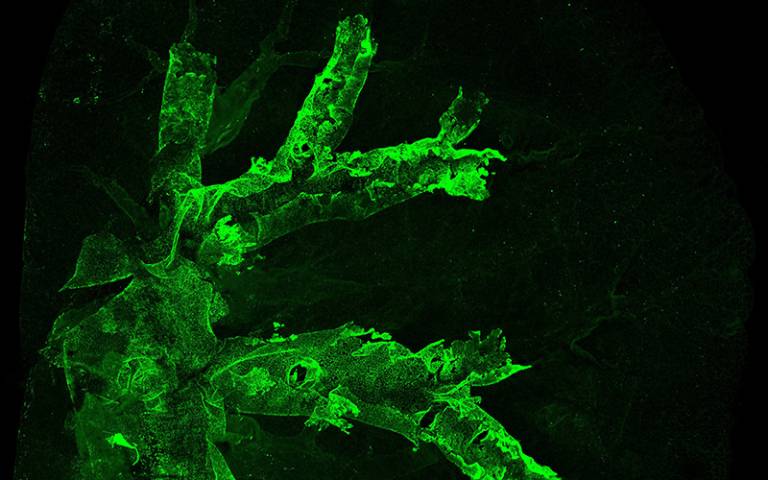
In the UK, people at high risk of lung cancer will soon be able to receive the first ever experimental vaccine designed to prevent the disease, in a world-first clinical trial led by researchers at UCL and the University of Oxford.
The research team has been awarded up to £2.06 million from Cancer Research UK, supported by the CRIS Cancer Foundation, to run a clinical trial of LungVax over the next four years.
This phase I trial will investigate the best dose of LungVax to give to people at high risk of lung cancer, as well as looking for any potential side-effects from different doses of the vaccine.
The trial is expected to begin in summer 2026, subject to regulatory approvals.
Professor Mariam Jamal-Hanjani, co-founder and lead for the LungVax clinical trials, from UCL Cancer Institute, UCLH and the Francis Crick Institute, said: “Fewer than 10% of people with lung cancer survive their disease for 10 years or more. That must change, and that change will come from targeting lung cancer at the earliest stages.
“The LungVax clinical trial is the crucial first step in bringing this vaccine to people at the highest risk of the disease. We will be looking carefully at how people respond to the vaccine, how easy it is to deliver, and who might benefit from it most in the future.
“Preventative vaccines will not replace stopping smoking as the best way to reduce the risk of lung cancer. But they could offer a viable route to preventing some cancers from emerging in the first place.”
Lung cancer cells are different from normal cells. They have ‘red flag’ proteins made by cancer-causing mutations within their DNA. These are called neoantigens and tumour associated antigens and appear on the surface of cells at a very early stage of lung cancer formation.
The LungVax vaccine carries a series of genetic instructions which train the immune system to recognise these tumour antigens on the surface of abnormal lung cells. In trialling the vaccine, the aim is to get the immune system to recognise these early abnormal cells, and kill them before they start to become cancer. The vaccine uses technology developed by the University of Oxford during the COVID-19 pandemic to deliver these instructions to the immune system.
Professor Sarah Blagden, co-founder of the LungVax project from the University of Oxford, said: “Lung cancer is lethal and blights far too many lives. Survival has been stubbornly poor for decades. LungVax is our chance to do something to actively prevent this disease.
“Years of research into the biology of cancer, understanding the fundamental changes which occur in the very earliest stages of the disease, will now be put to the test. This funding means that, for the first time, we hope that people will be able to receive LungVax in clinical trials from next year.”
To find out how safe and effective the vaccine is, the trial will initially focus on people who have been diagnosed with early-stage lung cancer and have had it successfully removed but are at risk of it returning. The vaccine will also be tested in people who are undergoing lung cancer screening as part of the NHS Lung Cancer Screening Programme in England.
If the trial delivers promising results, the vaccine could then be scaled up to larger trials for people at risk of lung cancer.
There are around 48 500 cases of lung cancer every year in the UK. Around 72% of lung cancers are caused by smoking, which is the biggest preventable cause of cancer worldwide.
Graeme Dickie, 55, from Kilbarchan in Renfrewshire, is helping the scientists prepare for the LungVax clinical trial. In 2013, aged 42, he was diagnosed with stage II lung cancer. By 2017, it had progressed to stage IV. He has never smoked. Over the years, he’s undergone surgery to remove part of his left lung, and more than 80 rounds of chemotherapy. When those treatments stopped working, Graeme began a new targeted treatment drug, mobocertinib, that he continues with today.
Graeme said: “I am proof that research saves lives. I have been able to enjoy many more happy years with my family thanks to scientists working hard, year after year, to bring new tests and treatments.
“For me, research is vital. I won’t be able to benefit directly from LungVax personally, but I know that my story will help others to access better interventions at an early stage.”
- Image of a lung lobe showing cells expressing the basal cell marker Krt5 spreading. Credit: UCL.
Source: University College London

